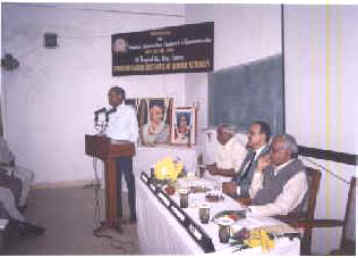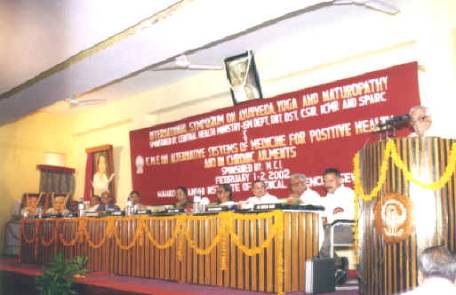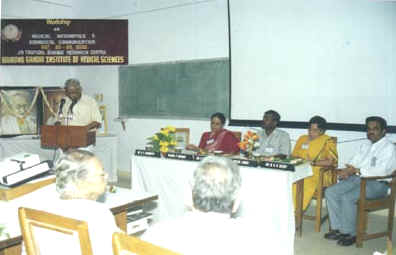|
|
January
1, 2002
Health
Care and Insurance – a Service or Business?
Sophistication and Modernization in
Health Care need considerable inputs and hence, Health Care services are
becoming costly. As the quality of state – planned and funded health programme
is deteriorating with time, sophisticated private hospitals are proliferating in
all cities making Health care a business. The poor and middle class cannot
afford costly private health care services. Under the circumstances, Health
insurance will be one of the many ways where by the poor can have access to
modern health care services. Presently the Indian health care industry in
Private sector is worth Rs. 73000 crore and expected to rise to 100,000 crore
annually according to a market study. Whether Privatisation of Health Insurance
will solve the health care problems of the poor in a developing country like
ours is debatable unless Health insurance is seen as Service than Business.
Further entry of multinational Insurance companies who are mainly interested in
capturing the insurance business than service by the welknown techniques of MNCs,
i.e. 1. by incurring losses by low premium in the first phase, destroying
domestic players and then monopolizing and increasing the premiums at will and
2. by characteristic Supplier – induced demand thus increasing the health care
costs making it prohibitive to economically disadvantaged groups. How much the
Insurance Regulatory and Development Authority will be successful in controlling
health care costs is questionable, as we have weak points in monitoring and
regulating to achieve intended objectives in the best interests of the Nation.
WHO is taking leadership role in
global thinking on health policy. Our country should seriously explore in
integrating Health Service and medical education and strengthen Medical colleges
to provide health care service affordable by masses. It is heartening to note
that Revered Sathya Sai Baba declaring that
Health care is not a Business and providing free health
care in Sathya Sai Hospitals.
Sevamed has completed two years of its
existence with support and appreciation from esteemed readers. We are grateful
to DBT for the support. We have made a small change in the title of the journal.
The content page was also modified to reflect our appreciation and gratitude to
our Founder Director Dr. Sushila
Nayar for her encouragement and support.
January 1, 2002

************
April
1, 2002

Shri.
Dhirubhai Mehta, President, KHS, Sevagram addressing the participants at the Inaugural
function of the International Symposium on Ayurveda, Yoga & Naturopathy on
February 1, 2002.
I
was astonished to see an advertisement in a local daily on ‘Processed Food’
by the Department of Food Processing Industries, Ministry of Agriculture (GOI).
The advertisement says “Processed Food” a healthy way to a convenient life
style issued in public interest. No doubt it is convenient but it’s healthy
way is questionable. The processed foods rightly called junk foods can never be
healthy foods. In the name of simplication and convenience for fast life, the
food industry mutilates the natural food and pollutes it with number of food
additives and chemical supplements, such as sulphites, nitrates, synthetic
flavours, artificial sweeteners, phosphates, silicates etc. as preserving,
stabilizing, flavouring, antioxidation and thickening agents. It has been
reported that allergy and asthma cases in the community have increased with
increased consumption of junk foods. The soft drinks are nothing but chemical
cocktails with zero nutrients. Recent study at BARC has found abnormally high
levels of hydroxy methyl furfural (HMF) in cold drinks not stored properly for
long periods. The HMF is neurotoxic, genotoxic, cytotoxic and tumorogenic. A
global epidemic of obesity is brought by the fast foods, refined sugars and more
consumption of fats reported in Lancet journal. All these reports and voices are
silenced by attractive, aggressive, repetitive & brain washing television
advertisements with offer of free gifts ranging from trip abroad to Cars, VCR
and Television sets, announced by favourite film stars. Children are more
vulnerable and readily seduced. One CEO of a Multinational confidently said that
children and teenagers are their targets. Once they are addicted, the business
will thrive without interruption.
So
called disclosure of all the ingredients on the package is a lie. Only Harish
Bharti, the famous Indian American Lawyer could go to court and win a $10
million settlement from McDonald’s for using beef extract and advertising that
it is vegetarian. Now he has targeted Pizza Hut for similar advertisement. The
hamburger, a fast food American meal is the subject of 41000 Federal and State
regulations from 200 laws touching meat production, starting with the grazing
practices of cattle, use of growth promoters before slaughter etc. With the
corruption endemic in India, will the rules be followed by multinationals in
making fast food, is anybody’s guess. Commerce entering food business changed
food consumption pattern affecting health of the people. Some Governments have
to issue dietary guide lines for the people to change their food habits, to cut
down on processed and refined foods and go for more fresh and wholesome foods to
prevent heart disease, cancer, strokes etc. Health Welfare board in some
countries have advised Rulers to ban attitude – changing advertising of junk
food and also to make junk foods more expensive and carry health warnings. There
is an urgent need for movement against junk foods. Before it is too late, The
Health Ministry may become wise and health educate and caution the people on the
ill effects of junk foods and discourage their use in canteens in educational
institutions.
************
October 1, 2023
When I recall my childhood days, I still remember the precious and
valuable paisa of those days. The rupee was divided into 192 paise.
The purchase value of the Copper paisa was so good, that I could get
easily – rice and uduth flour bajjia for a paisa for my snack during the
school class intervals. Everyone, the seller, the buyer and the onlooker look
satisfied and contented. Nowadays our salaries are increased by 15-20 times,
(forget the jobless which are increasing by the same speed) but still we feel
our ever increasing requirements are not met.
In these days of not affordable things, I searched for what we can afford
without incurring expenditure and gain in life. The trio, Silence, Fasting and
Meditation appeared smiling at my ignorance for all these years for living in
darkness. These are associated with energy conservation and charging, working as
holistic medicines for physical, mental, emotional and spiritual health.
Fasting is the supreme medicine for body cleansing and within reach of
everyone. It tones up the body and gives more energy to the body and also
spiritual strength. During fasting, the body uses the reserved food and
accumulated fluid, giving rest to the digestive system and helping the
elimination of toxins. One can start with fasting skipping a lunch or supper in
a day to complete one day fasting
in a week.
Concept like quietness should be experienced by living in that state. It
is part of Meditative process.
Meditation is the liberation of the mind from all disturbing emotions,
thoughts and desires. Meditation is the means to reach the inner mind, where the
thoughts originate and then the meditator reaches thoughtless state. Meditation
opens up some of the energy centres in the body and promote love, compassion,
joy and higher spiritual consciousness in the practitioner. In the morning or
night one can start meditating for 15 minutes and increase to an hour a day for
experiencing beneficial effects.
Thus the maintenance of silence, meditation and fasting do not cost a
paisa but require only willpower and determination.
October 1, 2023

|
Dr.
B. C. Harinath,
Co-ordinator, BIC Welcoming the participants at Workshop on ‘Medical
Informatics & Biomedical Communication’ held at BIC during September
23-25, 2002. Sitting on the dias from left are Dr. (Mrs.) P.
Narang, Dean,
MGIMS; Dr. T. Madhan Mohan, Director, DBT; Dr. Meera
Singh, Sr. DDG, ICMR
& Dr. M. V. R. Reddy, Professor